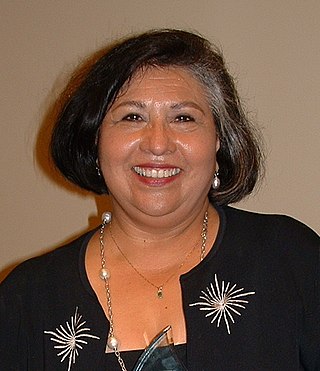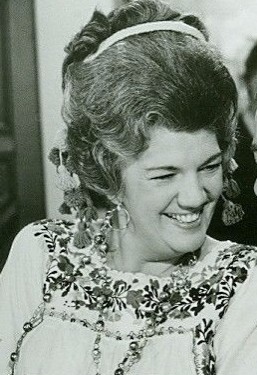
Carmen Amaya occasionally known by the stage name La Capitana, was a Spanish Romani flamenco dancer and singer, born in the Somorrostro district of Barcelona, Catalonia, Spain.

Jesús Gloria Molina was an American politician who served as a member of the Los Angeles City Council, the California State Assembly, the Los Angeles County Board of Supervisors and the Los Angeles County Metropolitan Transportation Authority.
Molina is a Spanish occupational surname. Molina is Latin for 'mill' and is derived from another Latin word, mola ('millstone'). The surname originated from the early Middle Ages, referring to a person who operates a mill or a millstone. Other Spanish surnames, like Molinero, have also originated in the work and management of a mill. Spanish municipalities like Molina de Segura (Murcia) or Molina de Aragón still nowadays include millstones or mill blades in their respective coats of arms.

Ángela Molina Tejedor is a Spanish actress. Aside from her performances in Spanish films, she has starred in multiple international productions, particularly in a number of Italian films and television series.
Dafne Molina Lona is a Mexican designer, model and beauty pageant titleholder who represented her country in the Miss World 2005 pageant, held in Sanya, China on December 10, 2005.

Carmen Margarita Zapata often referred to as "The First Lady of the Hispanic Theater" was an American actress best known for her role in the PBS bilingual children's program Villa Alegre. Zapata is also the co-founder and director of the Bilingual Foundation of the Arts in Los Angeles. Zapata took an active part in the Chicano movement of the 1960s and 1970s. Zapata was born in New York City to Julio Zapata, a Mexican immigrant, and Ramona Roca, an Argentine immigrant.

The Sisterhood of the Traveling Pants is a 2005 American coming-of-age comedy-drama film directed by Ken Kwapis from a screenplay by Delia Ephron and Elizabeth Chandler, based on the 2001 novel of the same name by Ann Brashares. It stars America Ferrera, Amber Tamblyn, Blake Lively, and Alexis Bledel. It follows four best friends who buy a mysterious pair of pants that fits each of them despite their differing sizes. They share the pants equally as they spend their first summer apart.

Laura Molina is an American artist, musician, and actress from Los Angeles, California. Molina is perhaps best known for her Naked Dave paintings. She is also the creator of Cihualyaomiquiz, The Jaguar, a self-published comic book printed under Molina's own Insurgent Comix imprint.
Maria Espinosa is an American novelist, poet, and translator.

Cielo rojo is a Mexican telenovela produced by Rafael Uriostegui for TV Azteca. Starring Edith González and Mauricio Islas, co-starring by Alejandra Lazcano and Lambda García, and with the antagonistic participations of Regina Torné, Andrea Noli, Ramiro Huerta, Gabriela Vergara, Aura Cristina Geithner, Alberto Casanova, Betty Monroe and Andrea Escalona Filming lasted from 4 April 2011 to 1 December 2011. It premiered on 23 May 2011 on Azteca Trece, occupying Entre el Amor y el Deseo's slot.

Olivia Tirmarche Molina is a Spanish actress.

Natalia de Molina is a Spanish actress from Andalusia. Since her film debut in the 2013 dramedy Living Is Easy with Eyes Closed, she has featured in films such as Food and Shelter, Quién te cantará, Bye, Schoolgirls and Undercover Wedding Crashers.

Elvira Catalina Quintana Molina was a Spanish-Mexican actress and singer.
Murallas blancas, is a Mexican telenovela that aired on Canal 4, Telesistema Mexicano in 1960. Production of Ernesto Alonso. The telenovela was talking about a woman who did everything possible to save their patients from a hospital where she was the nurse.

Carmen Salinas Lozano was a Mexican actress, impressionist, comedian, politician, and theatre entrepreneur. She was associated with the Institutional Revolutionary Party (PRI) during her later career as a politician.
Conflicto is a Mexican telenovela produced by Televisa and transmitted by Telesistema Mexicano.
Espejismo is a Mexican telenovela produced by Fernando Chacón for Televisa in 1981. It starred by Fanny Cano, Carlos Piñar, Enrique Rocha, Charito Granados and Carmen Molina.
Destino is a Mexican telenovela produced by Carlos Sotomayor for Televisa in 1990. Was divided in two parts. Is a remake of 1976 telenovela Mundos opuestos.
María del Carmen Serdán Alatriste was a Mexican revolutionary. She shared the ideas of the Mexican Revolution and sympathized with Francisco I Madero. She was the sister of Aquiles Serdán Alatriste, also a revolutionary, and granddaughter of Miguel Cástulo Alatriste Castro, who served as the Liberal governor of the state of Puebla from 1857 to 1861.
Gracia Molina Enriquez de Pick was a Mexican-American professor and activist.









